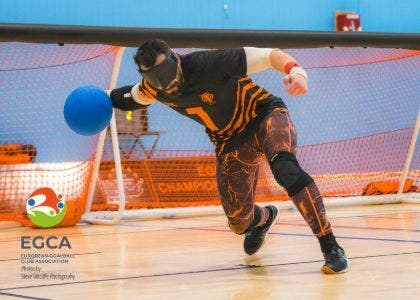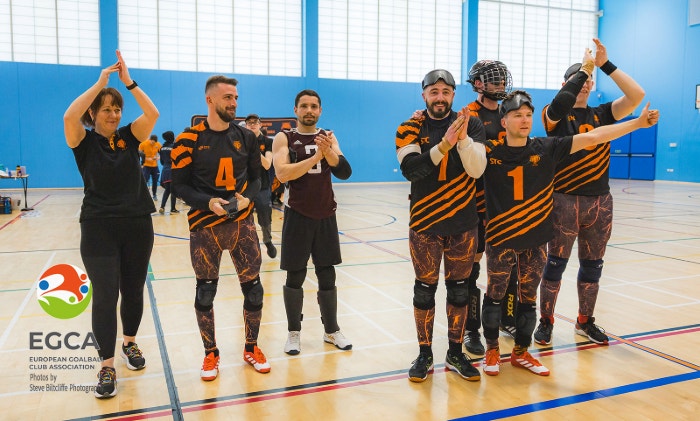
When CSSC member and founder of Fen Tigers Goalball Club, Emma Evans, approached CSSC for help with funding an international Goalball league, we were keen to find out a bit more about the sport, which is growing in popularity year-on-year.
What is Goalball?
Goalball is a high-energy, adrenaline-fueled Paralympic sport designed specifically for blind and visually impaired athletes, though sighted players can also take part. Played on a tactile court, it features a 1.25kg ball with bells inside, which allows players to track its movement using only their sense of sound and touch.
Teams of three take turns launching the ball at speeds of up to 60km/h, aiming to blast it past the opposition into the 9m wide goal. Defenders hurl themselves across the court, using their bodies to block and control the ball, making for a game that is as intense as it is tactical. Players wear blackout eyeshades, ensuring a level playing field where skill, strategy, and teamwork are the ultimate game-changers. Goalball is a sport like no other—fast, physical, and fiercely competitive.
Goalball is one of only two non-derivative Paralympic sports—the other being Boccia. Unlike adapted versions of mainstream sports (such as wheelchair basketball or blind football), goalball was designed exclusively for visually impaired athletes, making it a truly unique and inclusive sport.
How did you discover goalball?
I was first introduced to Goalball when one of my sons discovered the sport while attending the Royal National College for the Blind in Hereford. He quickly developed a passion for the sport, showing a natural talent. Around 11 years ago he earned a place on Team GB, where he remains a key player today.
When he returned home, he was determined to continue playing, but there were no local clubs—so we decided to change that. That’s how Fen Tigers Goalball Club was born. Since then, the club has grown into a thriving hub for players of all levels, including GB internationals, providing opportunities for visually impaired athletes to develop their skills and compete at the highest levels.


Images courtesy of Steve Biltcliffe Photography
Where can people watch goalball to learn more about it?
The GoalballTV YouTube channel is a great place to watch international elite level club goalball. The recent EGCA tournament, hosted by Fen Tigers, was livestreamed on GoalballTV and featured expert commentary from Paralympic commentator Brad Hope. To make the event even more accessible, audio description headsets were available for spectators in the venue, ensuring everyone could fully experience the action.
You can watch one of our games from the tournament here
Does goalball make an exciting TV sport?
Absolutely! Goalball has everything a TV audience loves—fast action, dramatic saves, and close finishes. The biggest challenge is making it accessible for a general audience, as the sport is played in silence to allow players to hear the ball. However, with innovative broadcasting techniques like player mic-ups, insightful commentary, and slow-motion replays, goalball could definitely find a place in mainstream sports coverage. Increased coverage would also be key in attracting sponsorship and funding.
Which countries are embracing goalball the most?
Goalball has strong roots in Europe, particularly in Lithuania, Turkey, and Germany, where it has mainstream recognition and significant funding. In the UK, the sport is growing, with clubs like Fen Tigers leading the way. Globally, Brazil, the USA, and Japan are also highly competitive in the sport.
Are there different goalball leagues for novices and experts?
Yes! Goalball UK, our sport’s National Governing Body, operates a structured league system, catering to all levels of play—from regional level for novice players through to an intermediate league and then the Super League for elite players.
How does someone find their local Goalball team/league?
The best place to start is through Goalball UK, which has a club finder on its website. Many clubs also run 'have-a-go' sessions, open to all. Organisations like RNIB, British Blind Sport, and local sports clubs can also provide information on goalball opportunities nearby.
If anyone wants to find out more, they can also head to Fen Tigers Facebook page and contact me direct.
Sports like wheelchair rugby have entered the mainstream—is this your hope for goalball?
Yes, that’s the dream! Wheelchair rugby has benefited from major media exposure and Paralympic success. If goalball received similar support—through sponsorship, TV coverage, and Paralympic promotion—it could grow in the same way. Greater exposure would mean better funding, more opportunities for players, and a stronger talent pipeline for GB teams.
What does the future of goalball look like?
Incredibly exciting. The sport is growing rapidly, with more clubs, tournaments, and international events than ever before. The recent European Goalball Club Association (EGCA) tournament we hosted as Fen Tigers in the UK was a landmark event, showcasing elite-level club goalball on home soil for the first time ever.


Images courtesy of Steve Biltcliffe Photography
How has CSSC’s funding helped you and your team?
The support provided by CSSC’s Disability Support Fund, which is sponsored by the CSSC Community Lottery was game-changing. Their funding helped cover essential costs like venue hire, equipment, and uniforms for volunteers and officials, making it possible for us to host a world-class event in the UK. This tournament gave top British club teams the chance to compete at the highest level without the barriers of international travel, opening up opportunities that many players wouldn’t have had otherwise.
For Fen Tigers, this was particularly significant. Competing in a high-profile European tournament on home soil allowed our players to test themselves against top-level opposition, gain valuable experience, and grow in confidence. It also strengthened our reputation as a leading UK club, attracting more interest from potential players, coaches, and supporters.
Beyond the competition, this event has had a huge impact on grassroots goalball in the UK, raising awareness within the sporting community and inspiring players at all levels—from beginners to those with international aspirations. Watching top-level international clubs, featuring Paralympic medallists, compete on home soil has been a powerful motivator, showcasing the skill, dedication, and potential of visually impaired athletes and encouraging more people to get involved in the sport.
Without CSSC’s funding, an event of this scale simply wouldn’t have been possible. The impact goes far beyond elite competition—it has strengthened clubs, encouraged new talent, and is already helping to build a lasting legacy for goalball in the UK.
Funding with CSSC
You don’t need to set up an international league, like Emma, to benefit from CSSC’s funding initiatives. Whether you want to organise a workplace wellbeing activity, enter a 10K run, gain sporting qualifications or join a local sports club, we might be able to help.
